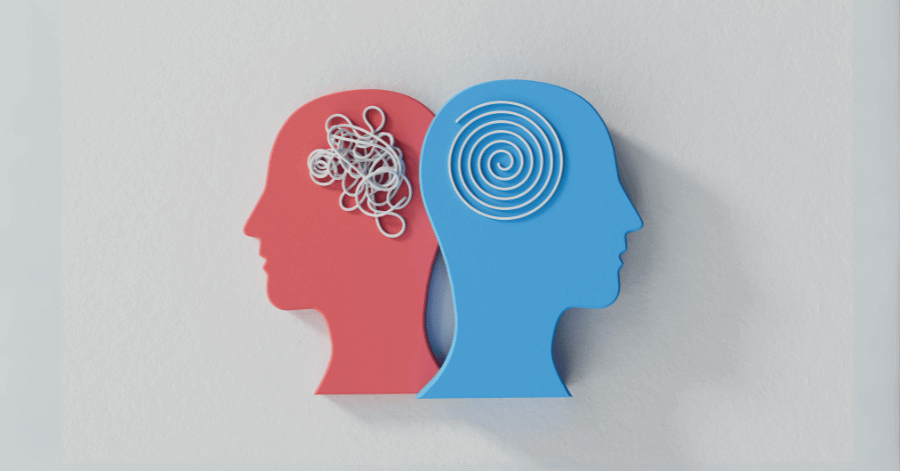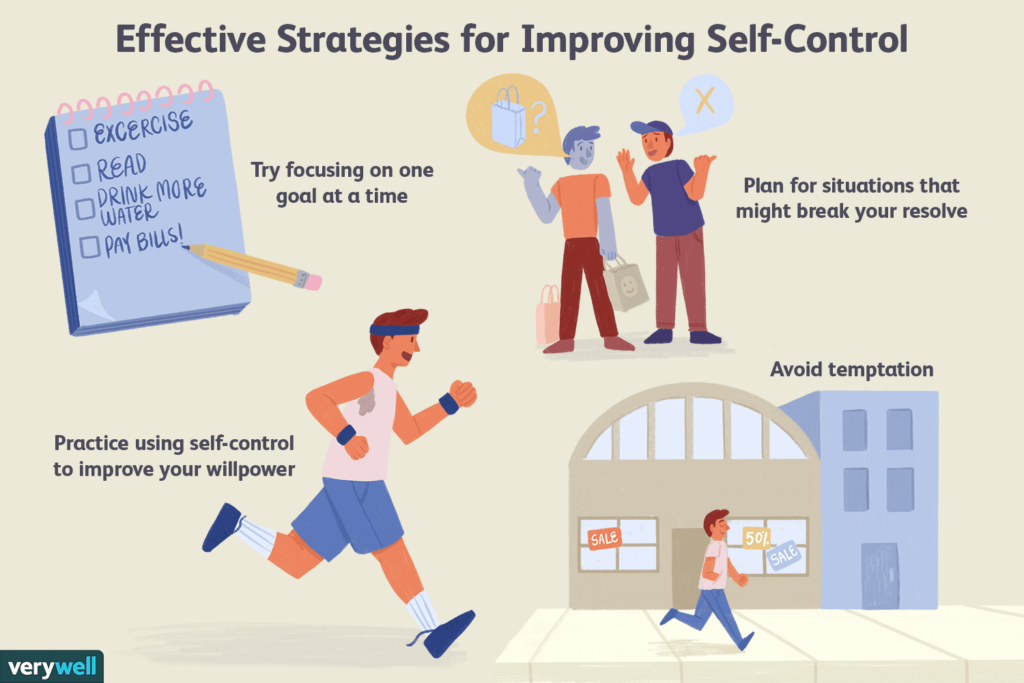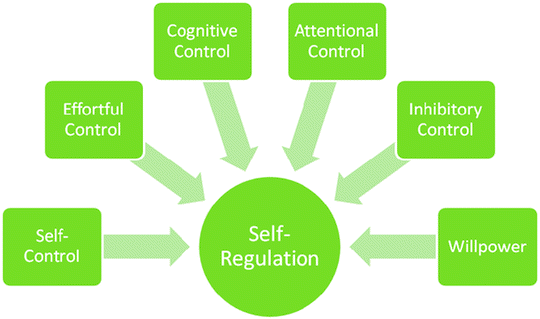Emotions play a significant role in our lives as they color our experiences, shape our reactions, and influence our decisions. However, it is essential to control our emotions because unchecked emotions can lead to chaos, confusion, and conflict. Therefore, the power of self-control is crucial to maintaining a healthy emotional balance.
Self-control is a critical component of emotional intelligence. It is the capacity to manage one’s emotions, thoughts, and actions in the presence of temptations and impulses. As an executive function, self-control is a cognitive process that is essential for regulating one’s conduct to attain certain objectives.
A lack of self-control can result in issues like impulsiveness and poor decisions. On the other hand, having good self-control is linked with better interpersonal relationships, higher academic accomplishments, and sound mental health. In brief, self-control is crucial for leading a well-rounded and balanced life.
Let me share a personal story that illustrates the power of self-control. The story is about a young man named Alex.
Alex was a skilled musician who possessed a quick temper. His fits of rage were infamous among his loved ones and acquaintances. Alex lost his composure during one of his band’s rehearsals and erupted in anger. He shouted at his fellow band members before storming out of the room. His actions created a divide within the band, and they were on the brink of disbanding.
After realizing that his lack of self-control was risking his dream of becoming a successful musician, Alex decided to make a change. He started practicing mindfulness, which is a technique that involves focusing on the present moment without judgment.
Through mindfulness, Alex was able to gain a better understanding of his emotions. He learned to recognize his anger before it became overwhelming and to respond to it in a more controlled and healthy manner.
Alex was able to improve his self-control over time. As a result, he became more adept at managing his anger, which led to better relationships with his bandmates. The band managed to stay together, and eventually, they achieved success. Alex’s story proves that self-control is a powerful tool that can help us overcome negative emotions and reach our goals.
Understanding Self-Control

Definition and Importance of Self-control
Self-control is a concept that can be both simple and complex. Essentially, self-control involves the ability to regulate one’s emotions, thoughts, and behaviors when faced with temptations and impulses. It’s about having the power to delay gratification, resist short-term temptations, and prioritize long-term goals. Additionally, it involves overriding unwanted thoughts, feelings, or impulses.
Self-control is an extremely important trait. It is a crucial aspect of emotional intelligence and a significant predictor of success in life. Research has demonstrated that people who possess high levels of self-control tend to be better at concentrating on long-term objectives, perform better in academic and professional environments, enjoy better mental and physical health, and have more fulfilling personal relationships.
Self-control involves more than just resisting temptation. It also requires the ability to recognize the right moment to take action. This includes expressing a feeling, voicing an opinion, or making a decision. It means being in charge of your actions, rather than being ruled by your impulses.
Relationship between Self-control and Mental health
The connection between self-control and mental health is noteworthy. Weak self-control is linked with various mental health issues like anxiety, depression, substance abuse, and personality disorders. Conversely, strong self-control is associated with better mental health results, such as reduced stress levels and increased psychological well-being.
Types of Self-control
There are different types of self-control, each of which plays a crucial role in our lives.
Impulse Control: This is the capability to resist immediate temptations or urges. This type of self-control allows us to refrain from acting on our immediate desires and instead focus on our long-term goals.
Emotional Control: This involves managing our emotions, keeping them in check, and preventing them from dictating our actions and reactions.
Movement Control: This type of self-control pertains to regulating our physical reactions, allowing us to maintain our composure even when angry or frustrated.
The Science Behind Self-Control and Emotions

The complex interplay between self-control and emotions is an intriguing topic of research in the field of psychology. It is a delicate balance where one affects the other, leading to a ripple effect that affects different areas of our lives. Let us explore the scientific aspects of this connection.
How Self-control Positively Affects Academic Emotions
Academic emotions are the emotions that one experiences while engaging in academic activities like learning, studying, and taking exams. Studies have indicated that regulating these emotions is linked to self-control, which plays a substantial role in managing academic emotions.
Research has shown that students with high levels of self-control tend to be more proficient in managing stress and anxiety related to academic tasks. Such students can maintain their focus during study sessions, resist distractions, and persevere even when tasks become challenging. This emotional regulation further leads to more positive academic emotions such as enjoyment and pride, and less negative ones such as frustration and boredom.
In addition, developing self-control helps students to efficiently manage their time, set achievable objectives, and work towards accomplishing them. These abilities help students prevent feelings of being overburdened and promote a sense of self-reliance and proficiency, which results in a more favorable emotional experience in academic settings.
The Role of Self-Control in Affective Well-being
Affective well-being is a term used to describe our emotional experiences, moods, and feelings. It encompasses both positive and negative emotions and how frequently and intensely we experience them. Self-control, on the other hand, plays a crucial role in influencing our affective well-being and has the potential to significantly impact our emotional experiences.
Research suggests that individuals who have high levels of self-control tend to experience more positive emotions and fewer negative ones. They can regulate their emotional responses to different situations, which allows them to maintain a positive mood and avoid negative emotional spirals. Therefore, developing self-control can be an effective way to manage one’s emotions and promote psychological well-being.
Self-control allows people to choose actions that lead to long-term happiness, even if there is short-term discomfort. For instance, resisting procrastination and completing a task can result in a sense of fulfillment and satisfaction.
The Impact of Self-Control on Mental Health
Developing self-control skills is a critical aspect of maintaining good mental health. It enables individuals to manage their thoughts, emotions, and actions, which can help prevent the onset of mental health issues. In essence, honing self-control skills can act as a safeguard against mental health disorders and promote a more satisfying and healthier life.
Self-control is a helpful tool that can aid individuals in resisting the urge to dwell on negative thoughts, which is a common symptom of depression and anxiety disorders. Additionally, it can assist individuals in managing their impulses, which can help to prevent the development of impulse control disorders, such as addiction.
Having self-control can have a positive impact on an individual’s resilience, which is the ability to recover quickly from difficulties. People with high self-control can handle stress and challenges more effectively by using coping strategies and managing their emotions. This can lead to better mental health outcomes.
The intricate interplay of self-control and emotions can positively impact academic emotions, enhance affective well-being, and protect mental health.
Practical Techniques to Improve Self-Control

Relaxation Techniques, Good Night’s Sleep, developing Healthy Habits, Goal Setting, recognizing Impulsive Thoughts
Improving self-control involves using various techniques, such as relaxation. Deep breathing, progressive muscle relaxation, and guided imagery can help calm the mind, making it easier to resist impulses. A restful sleep environment and maintaining a regular sleep schedule are crucial in preventing impulsive behavior by avoiding lack of sleep which can impair self-control.
Developing healthy habits such as regular exercise, a balanced diet, and adequate hydration can enhance cognitive function, including self-control. Having clear and achievable goals can enhance self-control as it aids in resisting distractions and staying focused.
Recognizing and acknowledging impulsive thoughts is a crucial step toward exercising self-control.
The Role of Mindfulness in Self-Regulation
Mindfulness, the practice of being fully present and engaged in the current moment, plays a significant role in self-regulation. It involves observing our thoughts, feelings, and sensations without judgment.
By practicing mindfulness, we can become more aware of our impulses and emotions. This awareness gives us the space to choose how we respond, rather than reacting automatically.
Mindfulness can be practiced through meditation, mindful breathing, or simply paying attention to everyday activities. Regular practice can enhance self-control, reduce stress, and improve overall well-being.
NLP techniques for Self-Improvement: Anchoring, Reframing, Visualization
Neuro-Linguistic Programming (NLP) is a powerful tool that can aid in personal growth and development. It comprises various techniques that enable individuals to improve their communication skills, overcome limitations, and achieve their goals.
From boosting self-esteem and confidence to managing stress and anxiety, NLP offers a range of practical strategies that can have a positive impact on one’s life. By comprehending the connection between the mind, language, and behavior, individuals can unlock their full potential and create lasting changes.
Anchoring involves creating a trigger or ‘anchor’ for a desired emotional state. For example, clenching your fist while feeling confident can create an anchor. Later, when you need a confidence boost, clenching your fist can trigger the confident state.
Reframing refers to altering our perception of a situation to modify our emotional reaction. For instance, considering a demanding job as a chance for self-improvement, instead of a menace, can help us approach the task with a more optimistic outlook.
Creating a mental image of the desired outcome helps to stay focused and resist distractions.
Combining NLP techniques with relaxation, sleep, healthy habits, goal setting, and mindfulness can significantly improve self-control. It’s important to remember that improving self-control is a journey, and these techniques are tools to help you along the way.
The Impact of Self-Control on Life Outcomes

How Self-Control Contributes to Better Interpersonal Relationships, Quality of Life, and Satisfaction
Self-control is an incredibly valuable tool that can have a significant positive impact on our lives. When we exercise self-control, we can better manage our emotions, leading to healthier and more fulfilling relationships. It helps us avoid emotional outbursts that can harm our relationships. By being more mindful and in control of our emotions, we can listen more effectively, respond more thoughtfully, and resolve conflicts constructively.
Self-control is an essential aspect that contributes to a better quality of life. It allows us to choose healthier options, resist harmful behaviors, and engage in activities that add value to our lives.
People who have good self-control are more likely to maintain a balanced diet, engage in regular physical activity, and avoid harmful substances. These healthy behaviors are necessary for our physical well-being, which is crucial for a good quality of life.
Self-control is strongly associated with a sense of satisfaction. It enables us to resist immediate gratification and work towards achieving long-term objectives, which gives a sense of fulfillment and satisfaction. Moreover, self-control can also improve our capacity to cherish and enjoy positive experiences, which contributes to a greater sense of happiness and contentment.
The Role of Self-Control in Managing Unhealthy Behaviors such as Alcohol Abuse and Overeating
The ability to control our impulses is crucial when it comes to managing unhealthy behaviors such as alcohol abuse and overeating. These behaviors often occur due to our inability to resist the urge of immediate gratification, which can have a significant impact on our long-term health and well-being. Therefore, it is essential to develop self-control to avoid such unhealthy behaviors and lead a healthier life.
Self-control plays a vital role in preventing alcohol abuse. It helps individuals resist the temptation to consume excessive amounts of alcohol. By setting limits on their alcohol intake, individuals can control their drinking habits even when under pressure from peers or in emotionally distressing situations. Additionally, self-control can aid individuals in seeking help and following through with treatment plans, thereby promoting their recovery and preventing relapse.
When it comes to overeating, having self-control can be a valuable tool to resist the urge to eat too much, especially when it comes to unhealthy food. It can help people make better choices about what they eat, control the amount they consume, and prevent emotional eating. Self-control can also improve the outcomes of weight management efforts, leading to a healthier body weight and better physical health.
Self-control is a powerful tool that can enhance our interpersonal relationships, quality of life, and satisfaction, and help us manage unhealthy behaviors. By understanding and harnessing self-control, we can lead healthier, happier, and more fulfilling lives.
Conclusion
In the journey of life, emotions are our constant companions. They add color to our experiences, shape our responses, and fundamentally influence our decisions. However, when left unchecked, emotions can lead to chaos, confusion, and conflict. This is where self-control, our unsung hero, steps in.
Self-control, as we’ve explored, is the ability to regulate one’s emotions, thoughts, and behaviors in the face of temptations and impulses. It’s about having the power to delay gratification, resist short-term temptations to meet long-term goals and override unwanted thoughts, feelings, or impulses. The importance of self-control in managing emotions and leading a balanced life cannot be overstated.
From the realm of academics to the sphere of personal relationships, from the pursuit of life satisfaction to the management of unhealthy behaviors, self-control plays a pivotal role. It’s the invisible thread that weaves together the fabric of a fulfilling life.
The science behind self-control and emotions reveals a fascinating interplay. By understanding and harnessing self-control, we can positively influence our academic emotions, enhance our affective well-being, and protect our mental health. Practical techniques such as relaxation, good sleep, healthy habits, goal setting, mindfulness, and Neuro-Linguistic Programming (NLP) can significantly improve our self-control.
As we conclude this exploration of self-control and emotions, it’s important to remember that self-control is not about suppressing emotions. It’s about understanding them, managing them, and responding to them in a way that serves our best interests.
So, as you navigate the ebbs and flows of your emotional landscape, remember the power of self-control. Practice the techniques discussed, be patient with yourself, and celebrate your progress. Remember, improving self-control is a journey, not a destination.
Embrace self-control, master your emotions, and unlock the door to a more balanced, fulfilling life. The power is in your hands.
Frequently Asked Questions (FAQs)
1. How to control your own emotions?
To handle your emotions in a beneficial way, it is important to acknowledge them. It is also crucial to identify the source of your emotions as it will help you understand them more effectively. Once you understand and recognize your emotions, you will be able to respond to them in a healthier manner. Some practical techniques for emotional regulation are mindfulness, deep breathing, and cognitive reframing. These techniques can assist you in managing your emotions and preventing impulsive reactions.
2. What are 5 ways to manage emotions?
There are various effective ways to manage your emotions and maintain a healthy mental state. Some of the best practices include incorporating mindfulness into your daily routine, using relaxation techniques like deep breathing or meditation, maintaining a healthy lifestyle that includes a balanced diet and regular exercise, seeking social support from friends and family, and consulting a mental health professional when required. By following these techniques, you can manage your emotions and lead a happier, healthier life.
3. How to stop showing emotions?
It is crucial to recognize and communicate our emotions in a healthy and suitable manner. There are several methods to achieve this, including deep breathing, mindfulness, and cognitive reframing. By using these techniques, people can manage their emotions more effectively, reduce stress and anxiety, and enhance their overall well-being.
4. Is self-control emotional maturity?
Emotional maturity is a crucial trait in individuals, and self-control plays a pivotal role in it. Self-control refers to the ability to regulate one’s emotions in a constructive manner and react appropriately to the feelings of others. By mastering the art of self-control, one can maintain healthy relationships, manage stress, and avoid impulsive behavior.
5. Why do I cry so easily?
Crying easily can have various causes, including high empathy, stress, or underlying mental health issues. Seeking professional help is recommended if it causes distress.
6. How to calm your emotions?
Techniques such as deep breathing, progressive muscle relaxation, mindfulness, and grounding can help to calm emotions.
7. How do I stop feeling emotional?
Managing emotions means acknowledging them, understanding their source, and making healthy choices in response to them.
8. How can I control my brain and emotions?
Practicing mindfulness, cognitive-behavioral techniques, and maintaining a healthy lifestyle can help gain control over one’s emotions and thoughts.
9. How to control tears?
To control tears, one can try deep breathing and distraction techniques. However, if the problem persists, it is recommended to seek professional help.
10. How to self-regulate emotions?
Self-regulation of emotions refers to the ability to identify and acknowledge one’s emotions, understand their origin, and choose a healthy and appropriate way to respond to them.
11. How to be strong emotionally?
Building emotional strength involves resilience training, mindfulness, positivity, and social support.
12. How can I control my emotions and life?
Control over emotions and life can be achieved through goal setting, emotional intelligence training, and maintaining a balanced lifestyle.
13. How to control love feelings?
Managing love feelings involves understanding, acknowledging, and aligning them with personal values and long-term goals.
14. How can I control my emotions without crying?
Managing emotions without crying involves techniques like deep breathing, distraction, and cognitive reframing. Professional help should be sought if symptoms persist.
Similar Topics
Scars to Stars: Healing, Building Resilience, and Thriving in Life
Discover the journey from scars to stars. Learn about healing emotional scars, building resilience, and thriving in life….
Embrace Endings for Growth and New Beginnings
Discover how embracing endings can fuel personal growth and lead to exciting new beginnings. Learn to navigate life’s transitions with…
Unlocking Success with Aligned Action: A Comprehensive Guide
Explore the power of aligned action in achieving goals. Learn strategies to bridge the gap between desire and reality….
Unlocking the Power of Self-Understanding
Explore the journey of self-understanding and learn how to cultivate it with our comprehensive guide….
Unlocking Feminine Energy – A Comprehensive Guide
Explore the power of feminine energy and learn how to cultivate it with our comprehensive guide….
See Beyond Sight – The Power of Faith and Hope
Dive into the world of Faith and Hope and understand their power in transcending the physical world. Discover how they…






